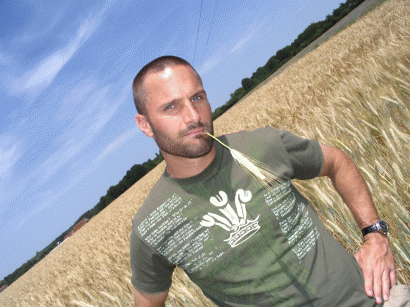
This interview is with Brady Whittingham, now of Think Partnership. I spoke with Brady shortly after he sold his company for about $20M. This interview will be useful if: you are interested in understanding how one of the top Internet offers in Utah works. You are interested in how to sell a direct response business for $20M.
Full Interview Audio and Transcript
Fast Track Interview
Adrian Bye: So Brady, what have you been up to?
Brady Whittingham: Life’s been crazy. After we got through all the details of the acquisition, I decided to retire for three weeks. My wife and family were due for a break, so I left my phone and laptop behind – no connection to the office whatsoever – and we went to Europe.. We spent time in London, and traveled all throughout France and Italy. It was awesome.
Adrian Bye: Sounds like a really great time.
Why don’t you tell us about yourself? I know that you were 19 when you went and did some missionary work in Spain. How did this fit in with your goals? Did you feel like you were being delayed?
Brady Whittingham: Not a delay at all. I grew up in a Mormon family in Utah, and so it’s a fairly standard practice to expect that at 19 you’ll go on a mission. Unless you’ve really changed your views between the time you’re eight years old, when you’re baptized, and 19 years old when it’s normal for active Mormon kids to go do this for two years. It’s not anything that’s forced, but I would say there’s a certain amount of social pressure. However, it’s purely by choice, and you pay your own way.
Basically, after high school, most Mormon kids will either attend one year of college or work for a year to save money and then go on a mission.
If you go, you really grow up during those two years. From 19 to 21 years old, you’ll leave your family and friends, and you literally will not see anybody that you know. Even if you serve your mission in Idaho, and you live in Utah, it’s highly discouraged that you have any interaction, other than writing letters. You’re supposed to be completely focused on teaching interested people about your religion.
Adrian Bye: For the two years that you spent out, how many people did you get involved with Mormonism?
 Brady Whittingham: In Spain, it’s a fairly closed country as far as new religion opportunities. People are Catholic, and they’re comfortable that way. They’re not too open to change. In a two-year span, we would get maybe five to seven people interested to the point where they were baptized and became members of the Church of Jesus Christ of Latter Day Saints (the official name of the Mormon church).
Brady Whittingham: In Spain, it’s a fairly closed country as far as new religion opportunities. People are Catholic, and they’re comfortable that way. They’re not too open to change. In a two-year span, we would get maybe five to seven people interested to the point where they were baptized and became members of the Church of Jesus Christ of Latter Day Saints (the official name of the Mormon church).
Adrian Bye: While teaching others about your religion is, of course, a deep and spiritual experience, in a way it can be related to the industry. You’re effectively selling something, so how removed is this from door-to-door sales? Do you think the work that you did promoting your religion has helped you with what you’ve done on your online business?
Brady Whittingham: Absolutely. It is similar to door-to-door sales, but when you’re talking about religion, you don’t want to convince somebody to join your religion, you want them to feel it inside themselves, spiritually. So it’s really not the same as knocking on the door and trying to sell a set of steak knives.
Adrian Bye: So knocking on doors, what percentage of people would actually be willing to talk with you?
Brady Whittingham: In Spain every apartment building was ten to fifteen stories high. You start at the top, knock on every door, and work your way to the bottom. If a ten-story building has four apartments per floor, you’re knocking on 40 doors, but it was highly unlikely that you’d get invited into any of them.
So, you do have to get creative. We’d go down to some of the main paseos and set up a booth or display. Then we would just strike up conversations with every single person that walked past. In a way, the type of marketing you do at a trade show is very common in a mission, and if you don’t go outside the box, you can spend two years knocking and having doors slammed in your face.
The missionaries come back to Utah, and I would guess that’s why there is a disproportionate amount of sales organizations in the state. If you’re willing to go and strike up conversations cold to talk about religion, something that people, for the most part, don’t want to talk about, making the transition is pretty easy when you get back. Rejection no longer bothers you. When you’ve already experienced two years of people slamming doors in your face, spitting on you and swearing at you, it’s very easy now to pick up a phone or go door to door.
Adrian Bye: Fascinating. So we’ve talked a lot about your religion, let’s talk about your business.
Brady Whittingham: Sure. I got my start as an entrepreneur back in 1999 when I launched WinDaily.com. It was a traditional co-registration data company. We did well, but it wasn’t too long before all the CPMs and CPAs started disappearing. People started to pay attention to what they were getting, and they were no longer just building a database.
We made some shifts, and we started giving away free vacation certificates and selling the leads to travel companies in Florida. Companies that wanted to capture data on people that were interested in travel. We did quite well and decided that we were going to shift the model and instead of just giving away these vacation certificates, we were going to give those away free, plus shipping and handling.
So now we’re in 2000 and we rolled out our first free plus shipping and handling program. As a lead generator it strengthened the quality of leads because now not only did somebody tell us that they were interested in travel, but they were willing to pay for it.
 When 9/11 hit, our travel business disappeared overnight, for obvious reasons, and we were forced to figure out, with our 50 employees that we had, how we were going to survive. We looked out into the market, and in Utah there were a high number of telemarketing companies that sell home business opportunity. So we were introduced, through a former partner of mine, to some call centers that needed business opportunity leads. They needed to find people who were interested in making money from home, and then they’d do the rest.
When 9/11 hit, our travel business disappeared overnight, for obvious reasons, and we were forced to figure out, with our 50 employees that we had, how we were going to survive. We looked out into the market, and in Utah there were a high number of telemarketing companies that sell home business opportunity. So we were introduced, through a former partner of mine, to some call centers that needed business opportunity leads. They needed to find people who were interested in making money from home, and then they’d do the rest.
We rolled out a program called Free Boulevard. We were selling a home-based business that told people how to make money from their desktop for $29. Then we’d sell that lead to the call center, and we found another gold mine. It wasn’t long before every call center in Utah was knocking down our door trying to get some of our leads.
My partner was much more interested in travel which was mostly offline, and I was much more interested in business opportunity which was mostly Internet marketing. In mid-2002, we made the decision to split. My division was worth a little bit more than his at the time, so I agreed to pay him some money. I took the Internet business, and we called it ‘iLeadMedia’.
Since that time, we’ve really refined our focus. Instead of just generating leads, we’ve developed some of our own home business opportunity packages. The primary package that we sell is an Ebay training program. We got back to our roots of free plus shipping to capture a qualified customer, and we started selling free plus shipping ‘Learn How to Sell on Ebay’ programs.
The company has been very successful. We’ve had to change our business model, drastically once, and slightly over the last few years but I have hired some very capable, talented people. I think that the strength of this company is the team that we’ve assembled, and the fact that the team works together – a success engine.
Adrian Bye: So you’re doing Ebay now, are there other markets that you’re interested in going into, or moving into, in the future?
Brady Whittingham: Joining Think partnership has expanded us into a number of different opportunities – whether or not we actually own the programs. There’s a tremendous opportunity to create leads in the fitness space, credit repair space, debt consolidation space, stock market and real estate. You can expect to see us out there as a third party service provider, generating leads and sales for companies in these mass appeal categories.
Adrian Bye: Can you tell us how iLeadMedia and Think Partnership came together?
Brady Whittingham: About a year ago, we decided that we were ready to take our company to the next level. We were going to find either a venture capital firm that wanted to put some money and experience into the company or find a company that was willing to bring us into what they were doing, as an acquisition.
A good friend of mine, Rob Nicolosi from Transact, had heard of a company that was acquiring – Think Partnership. He lined up a phone call between a representative of Think Partnership and myself. We went through the same basic numbers and the same basic reasons why we were ready to take it to the next level with a partner. That same day, I mentioned that phone call to Roth Capital Partners, our investment banking firm, and their faces kind of dropped and they said, “That is so odd. We’re having dinner tonight with the executive management team of Think Partnership”. I don’t usually believe in fate or karma, but I think the stars kind of aligned that day.
I went out to the Roth Capital Partners investors’ conference that they have in New York every November. That’s when we spent a lot of face-to-face time with the then Chairman of the Board and CEO, Ben Jennings and Gerard Jacobs, and they liked what they saw. We hired an audit team to take a look at our books and make sure that everything was in order. They hired their audit team and started that process as well. We signed our letter of intent with them.
As our deal progressed, internally there were some things progressing as well, and as you’ve been able to read, I’m sure, by watching the news releases about Think Partnership, it was time that the old management stepped aside and the new management stepped forward. Ben Jennings, Gerard Jacobs and another board member left the company. This was right near the time we were supposed to close our deal.
We just kept pressing forward and I developed a great relationship with Scott Mitchell, who is now the CEO and is the guy that’s running this company. Scott kept us on the hook. He got through the internal issues, got our deal approved by the Board of Directors, we signed up and away we went.
Adrian Bye: There are some great companies inside Think Partnership, but the overall financials don’t look very strong. How do you respond to that?
Brady Whittingham: From the very beginning, Roth told us that this company is a broken story, and they believe that it can be fixed. A lot of the things that have happened over the course of the last several months are huge steps towards fixing the story.
What’s important is that I know what my company’s doing. I know what the other subsidiary companies are doing, and by integrating our talent and our businesses, and leveraging the synergies that exist, I have no doubt that we’ll fix the broken story. In my opinion, the market hasn’t seen anything yet. We’re maturing; we’re getting our synergies together. Every company that I’m familiar with in the partnership is very healthy, and I’m excited to show the market what we can do.
Adrian Bye: Think Partnership is a very distributed company even though there are many divisions that operate very closely. So you’re not getting the same level of ideas, compared to if you’re all in one building and working together day by day. What’s your response to that?
 Brady Whittingham: Well, you certainly are made smarter by surrounding yourself with people that are smarter than you. What you say about being in the same building, it’s partially accurate. It would allow you to sit down together at a conference table on a more regular basis. For me, I get more out of the monthly meetings that are organized between the Presidents. I think you’d take the day-to-day involvement with each other for granted, and everybody’s so busy, you actually wouldn’t have time to sit down with Presidents on a regular basis.
Brady Whittingham: Well, you certainly are made smarter by surrounding yourself with people that are smarter than you. What you say about being in the same building, it’s partially accurate. It would allow you to sit down together at a conference table on a more regular basis. For me, I get more out of the monthly meetings that are organized between the Presidents. I think you’d take the day-to-day involvement with each other for granted, and everybody’s so busy, you actually wouldn’t have time to sit down with Presidents on a regular basis.
I think the way that Scott and the senior management team is organizing our off-site Presidents meetings – where we go into those meetings with a strong agenda of things that we want to accomplish and we leave those meetings with a tasks list and responsibilities – I get that stimulation. Then I have 30 days to capitalize on the stimulation and make things happen before we get back together and do it all over again. That combined with the fact that I have nine IM chat windows going on at any given time. They’re all organized and tiled across my screen and that’s how I stay in touch on a regular basis with the other Presidents and the other people in the management of this company, so I get plenty of stimulation. My guys here at iLeadMedia, they joke around about my A.D.D. I get to the point, with any business, when it’s operating smoothly and making money, and it probably shouldn’t be changed – I get antsy.
So, for me the opportunity to work with 12 other companies all with very unique business models is the perfect medicine for my A.D.D. I’m stimulated every day now that I’m back to work after my three-week retirement.
Adrian Bye: Was there anything else you wanted to mention?
Brady Whittingham: Well, iLeadMedia is known for having offers that convert, and we’re always looking for more partners to run those offers with us. We are very appreciative of the affiliate networks that we work with. If an affiliate is reading this article and they have a strong relationship with an affiliate network, we encourage them to work with their affiliate network and ask for iLead offers. Our current top performer is eBay for Dummies.










